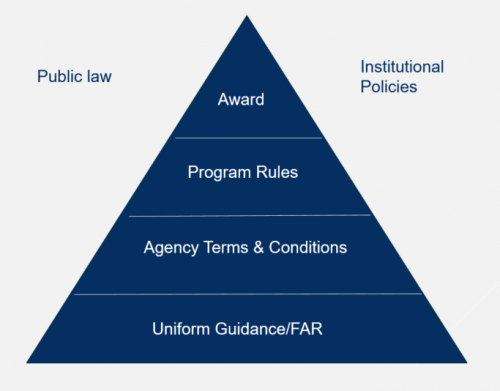Post-Award Sponsored Programs Administration

A sponsored project is one that is sponsored, or funded, by an external organization like a federal funding agency, state agency, or public/private organization. As such, the Office of Sponsored Programs (OSP) supports the CSU community in pursuit and conduct of externally funded projects, providing both pre- and post-award services.
The basic functions of many post-award units center on ensuring good stewardship of sponsored funds. As the award recipient, the institution is responsible for the fiscal management of the award which includes compliance with sponsor and institutional regulations.
At CSU, sponsored programs administration is a shared responsibility across many units including departments, centers, schools, colleges, business units, and the central OSP. Because roles and responsibilities are distributed broadly, successful post-award administration relies on partnerships and effective communications between units and a clear understanding of the roles and responsibilities inherent in the various post-award functions.
Award Management
Investigators and research administrators have the responsibility for assuring institutional compliance with sponsor/program regulations while adhering to institutional practices. In order to be successful, both investigators and administrators must understand sponsor requirements and the regulatory requirements that govern each award.
Regulations governing awards have proliferated over the years. Understanding governing rules and regulations, along with institutional policies and practices, is essential for effective, compliant award management. The Office of Management and Budget (OMB) oversees the basic structure of award management for the federal government. OMB develops the regulations for all federal agencies from which individual agencies produce agency and program-specific rules and regulations. Non-profit and commercial sponsors often have their own requirements while the university follows institution and state rules and regulations.
Federal Regulations
2 CFR 200 – Uniform administrative requirements, cost principles, and audit requirements for federal assistance awards (aka, Uniform Guidance) is guidance to the federal agencies and serves as the foundation for developing agency regulations.
FAR– Federal Acquisition Regulations is a listing of the policies and procedures regarding government procurement.
Agency-specific Regulations
Federal agency regulations vary from agency to agency and by programs within an agency as well as by award type. There are three types of federal awards: grants, cooperative agreements, and contracts.
- Grants provide financial assistance for the public good and usually have low levels of sponsor involvement in the programmatic activities. Grants typically follow standard guidelines established by the sponsoring agency.
- Cooperative agreements are also financial assistance awards though there is a higher level of sponsor involvement in the project activities. Often cooperative agreements will include specific, unique clauses in the award agreement.
- Contracts are a procurement mechanism used to acquire goods or services for the benefit of the sponsor. Contracts are governed by agreements that are executed between the sponsor and any parties to the contract.
Institution-specific Regulations
Every institution has its own systems, policies, and guidance for the management of sponsored programs. Public-controlled institutions of higher education, like CSU, have additional state regulations that must be followed. Some of the CSU systems and policies for award management include:
Account guidance: Guidance on charging administrative salaries and electronic devices on sponsored awards; how to handle over-expenditures; processes for requesting/justifying cost transfers and more can be found on the OSP website.
CSU Policies: Policies and guidance related to the management of sponsored programs (e.g., cost sharing, effort reporting, etc.), as well as additional institutional policies, can be found in the CSU Policy Library.

Order of Precedence Pyramid
The Order of Precedence Pyramid represents the order priority of the regulations for federal awards. At the top is the award itself, with award terms and conditions taking priority over general agency terms and conditions. At times, institutional policies and state laws may be even more restrictive than the award terms and conditions. In general, the most restrictive rules must be followed.
Compensation – personal services and Effort Reporting
Investigators compensated for their time and effort on a federal award are expected to verify that the compensation received, whether directly charged to the sponsored award or cost shared, is in line with the work performed. At the proposal stage, investigators estimate the amount of time they will work on a project. During the course of the award, salary and wage charges are made to the award based on forecasted projections. Effort reporting is used to validate the charges or to make adjustments based on actual time spent working on project activities.
At CSU, ecrt (Effort Certification & Reporting Technology) is the application used to confirm salary and wage charges to sponsored agreements. Investigators are asked to verify salary and wage expenses for each project on a quarterly basis.
Subrecipient Monitoring
When CSU receives an award that includes other institutions or organizations that will be programmatically and financially responsible for completing part of the project’s scope of work (subrecipients), the OSP issues a subaward agreement (aka, Outgoing Subawards).
There are two aspects of the subaward process that occur during the post-award stage:
- subrecipient monitoring
- subrecipient reporting
When CSU transfers a portion of an award to another entity, we are responsible for monitoring the technical progress and financial management of the subrecipient for compliance with the award terms and conditions. Subrecipient monitoring involves the investigator, unit administrators, and the central OSP.
In addition to subrecipient monitoring, under the Federal Funding Accountability & Transparency Act (FFATA) of 2010, entities receiving federal funding are required to report how those funds are being spent— this includes funds exceeding $25,000 that are subawarded to another entity.
Collection of financial data, review of subrecipient invoices, monitoring of research expenditures, and collecting data for programmatic and financial reports takes a collaborative effort among investigators and administrators, both at CSU and at the subrecipient organization.
Financial Reporting and Closeout
Over the lifecycle of a sponsored award, the institution has the responsibility to monitor the fiscal activities of the project which includes funds subawarded to other entities. At CSU, OSP post-award staff are assigned based on the sponsor and work closely with OSP research administrators, unit administrators, and investigators to ensure funds are spent appropriately and that award terms and conditions are followed.
Post-award staff review charges to the sponsored award to ensure costs benefit the award and are necessary to carry out the scope of work proposed, are reasonable, and are allowable according to sponsor and institutional terms and conditions. These cost principles form the basis for fiscal management.
Allowability | Cost is eligible for reimbursement by the project/sponsor terms and conditions |
Reasonableness | Cost does not exceed that which would be incurred by a prudent person under the circumstances when the decision to incur the cost was made |
Allocability | Costs should benefit the project proportionally |
Consistency | Costs must be treated consistently for all work of the organization under similar circumstances, regardless of funding source |
Conformance | Costs should conform with any limitations and exclusions set forth in the award terms and conditions |
Continued monitoring of budgeted funds against actual expenditures is key to ensuring the award is spent in accordance with regulations. Most agencies require annual and final financial reporting to ensure the institution is spending appropriately to meet the proposed objectives. At CSU, OSP is the unit that maintains auditable financial records for sponsored programs administration. As such, all financial reporting should come from the OSP.
In conjunction with the final financial report, the institution must officially close the project. At CSU, project closeout is a joint effort between the OSP, unit administrators, investigators, and related offices.
ROLES & RESPONSIBILITIES MATRIX: PROJECT CLOSEOUT
Audits
Audits and fund management go hand-in-hand. In fact, entities expending $750K and greater in federal funds in a fiscal year are required to have an audit for that year based on the Single Audit requirements outlined in 2 CFR 200, Subpart F. In addition to this audit, sponsoring agencies may conduct audits to verify the suitability of an institution’s financial management systems prior to issuing an award or may perform an audit on a specific project after an award has been made. Additionally, institutions of higher education have internal audits on all business and financial matters, which includes sponsored programs, while state institutions of higher education, like CSU, receive state audits.
While the purpose or reasoning for audits may differ, generally auditors are looking to ensure the institution has adequate controls in place that reduce the risk of fraud and abuse in the stewardship of federal funds. Audits of sponsored projects help ensure sponsored funds are being spent in accordance with sponsor, program, and institutional regulations and in accordance with the intent of the award.
While the discussion of audits often falls under Post-award Research Administration, audit preparation begins at pre-award and should continue throughout the life of an award. Successful grantees and grant managers understand how the cost principles affect their awards and have the internal controls in place to ensure good stewardship of sponsored funds.
The role of the research administrator in the audit process is to assist the institution in developing appropriate standard systems, policies, and internal controls. Like all things sponsored programs, it’s a shared responsibility.
Summary
Post-award sponsored program administration is a responsibility that is shared between investigators, department/unit administrative offices, sponsored programs, and related offices. Because of the sheer number of individuals and units involved with a given sponsored project, everyone must have a clear understanding of their roles and responsibilities and must be in communication in order to effectively and successfully manage sponsor funds.